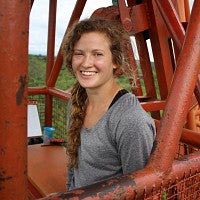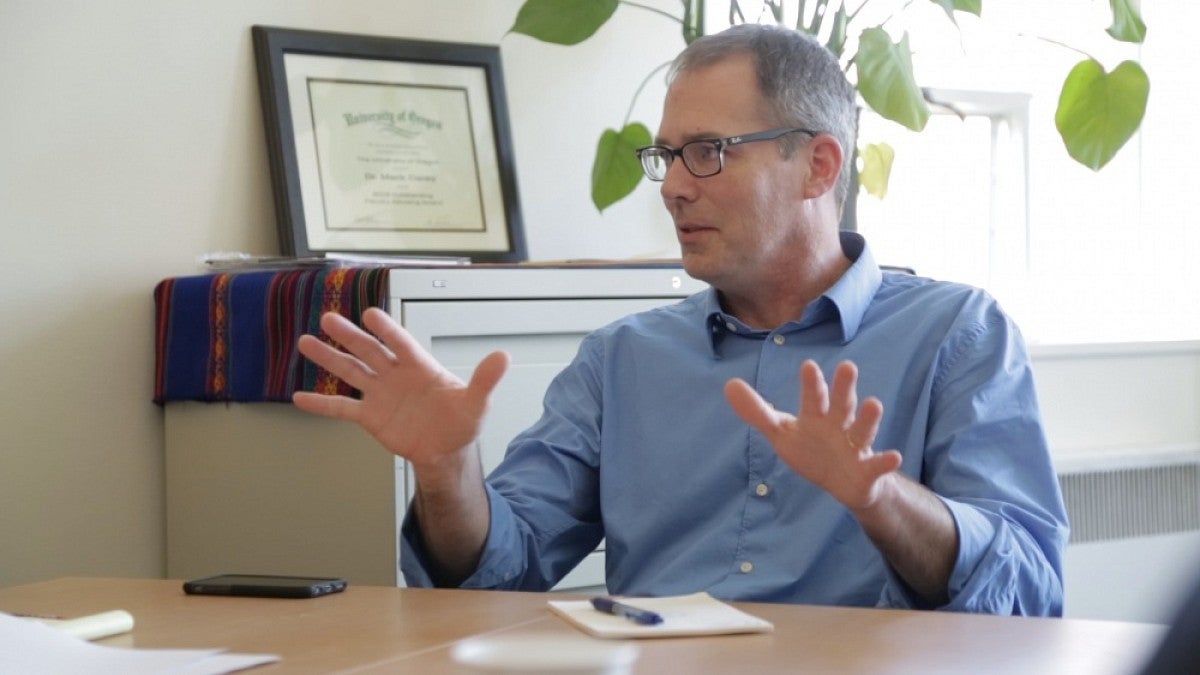Clark Honors College Professor Mark Carey’s Glacier Lab is one of a kind.
“I have never heard of any historian, at any university anywhere else, that has a lab or a group like this,” Carey said.
The Glacier Lab is a social science lab run by Carey, a historian by training, and a team of undergraduates, graduate students, doctoral candidates and postdoctoral students. The lab has a focus on the study of ice and its effect on the human experience, but Carey also focuses on the betterment of his undergraduate team members through mentoring.
“There’s the research, there’s the writing and then there’s also opportunities for professional development,” he said. “When you’re a sophomore or junior in the honors college and you’re meeting every couple weeks with Ph.D students and looking at a National Science Foundation proposal or a Fulbright proposal, and you’re reading those and having to give feedback, it raises your game across the board.”
The collaborative environment of the lab has led to two undergraduate honors college students, Becca Marshall and Augustine Beard, winning Humanities Undergraduate Research Fellowship grants—a 16-week fellowship that funds independent research.
Beard won the fellowship in winter 2016 and Marshall started her fellowship winter 2018. Marshall will present her research on mushroom harvesting in Oregon, which she conducted through the Glacier Lab and fellowship, during the Undergraduate Research Symposium in May. Beard also won a 2016 Vice President for Research and Innovation undergraduate fellowship, which Carey mentored, for his research inspired through the Glacier Lab.

“I call it the Glacier Lab, but it’s pretty open,” Carey said. “There’s a bit of flexibility in terms of what people work on, so I would describe it as general environment-society and environmental justice research.”
“We’re all pursuing our own interests, I think what unites us is most of us have researched with Mark, but the lab itself is us working on our own research and workshopping that and getting feedback from other members,” Marshall said.
As the Glacier Lab team has grown, Carey has been deliberate in choosing students whose personalities add to the positive learning space.
“I do think there is something about the personalities and how we interact with each other that helps make it a good dynamic,” Carey said. “It has to be a friendly, collaborative and supportive group where you can put incomplete work in front of other people and trust that it’s safe to do that.”
The group regularly reviews each others’ publications, resumés, grant proposals, essays, cover letters and more.
“We looked at a draft of a grant proposal for one of our members, Holly Moulton, and she just got the grant, so it’s been a great experience helping workshop and provide feedback for other Glacier Lab members’ work and then seeing their hard work pay off,” Marshall said, referring to the Tinker Field Research Grant through the Center for Latino/a and Latin American Studies. “Also it’s inspiring, as an undergrad, to see higher-level work and how everyone struggles in those beginning stages. I think it makes it a little less intimidating."
Marshall also utilized the help of her peers in the lab when she was applying for the Peace Corps.
“They all provided wonderful, constructive feedback, which helped me improve and make my application more competitive,” she said.
Marshall just received notice that she will join the Peace Corps in Gambia later this year working with an agriculture and sustainable food systems program.
Carey credits the cultivation of high-achieving team members to the spirit of honors college students.
“It takes student commitment, open mindedness, curiosity and interest in personal growth, and that’s particularly strong here in the honors college,” he said. “Our environment creates a situation that makes this unique social science and history lab work, so that undergraduates, graduate students, postdocs and faculty can all collaboratively work together on individual projects.”
Marshall is grateful for the opportunity she has had to work with the Glacier Lab team, as well as the opportunities she has received because of her experience in the lab.
“The lab environment is extremely supportive and collaborative,” she said. “My work improves tremendously from the feedback the members give me. The opportunity to be in the lab has opened a lot of doors for me.”
—By Isabella Garcia, Clark Honors College multimedia communications assistant


